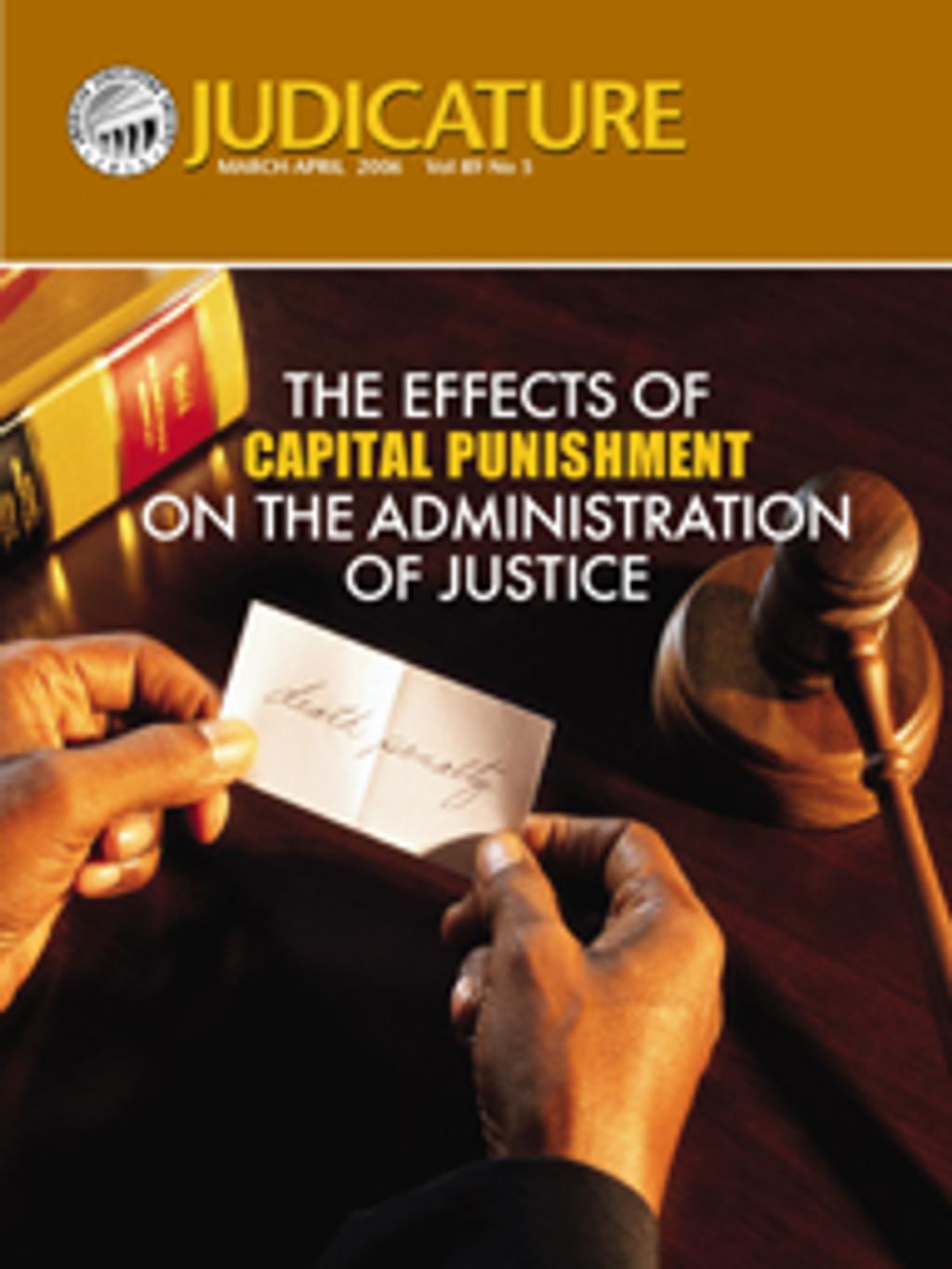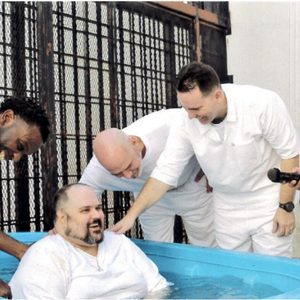
Judicature Journal Examines Impact of Death Penalty on Justice System
The March-April 2006 edition of Judicature, the journal of the American Judicature Society, includes a series of articles about the effects of the death penalty on the administration of justice. The following quotations are from these articles:
The Shadow of Death: The Effect of Capital Punishment on American Criminal Law and Policy by Carol Steiker and Jordan Steiker, law professors at Harvard and University of Texas, respectively
“[T]he presence and prominence of the death penalty tends to obscure the extraordinary rise in the American prison population (both in absolute and percentage terms). The death penalty, as the most severe punishment and the clearest symbol of state authority, is the obvious target of reformist efforts. Though the United States has become an outlier both in its retention of the death penalty and in its rates of incarceration, the fascination with death crowds out concern about punitiveness on the non-capital side.”
Tinkering with the machinery of death: Capital Punishment’s Toll on The American Judiciary
by Michael Hintze, Senior Attorney at Microsoft
“Based on the experience of 30 years since the Furman decision, it appears to be inevitable that the existence of the death penalty undermines the confidence in and toward the judiciary.
…
“At some point, our legislative bodies and the judiciary itself (following the lead of Justice Blackmun and others), must ask whether maintaining the death penalty is worth it.”
Capital Punishment and the Administration of Justice: A Trial prosecutor’s perspective
by Bill Hawkins, Asst. District Attorney, Harris County, TX
“In a large jurisdiction like Harris County, the prosecution of a capital death case does not significantly affect the ordinary operations of the office.
…
“In Texas, non-death capital jury selection is completed in a day. Death penalty jury selection, by comparison, lasts close to three weeks average in Harris County where death cases are handed down more often. In other jurisdictions where seeking death is a rare instance, jury selection may last much longer due to the inexperience of the parties involved.”
Defending Death Penalty Judgments by Dane R. Gillette,
Senior Asst. Attorney General, California
“Even apart from the litigation surrounding execution dates, defending death penalty judgments is among the most difficult and time-consuming work of the office. Pervading every aspect of a capital case, from the decision by the district attorney to seek death, through trial, appeal, and collateral challenges, is solemn appreciation of the consequences when the state prevails: the condemned inmate will be executed.”
How the Malfunctioning Death Penalty Challenges the Criminal Justice System
by R. Neal Walker, Director of the Louisiana Capital Assistance Center in New Orleans
“One would hope that the sheer number of exonerations would convince the bench and legislatures in death penalty jurisdictions that, even with jurisprudential promises of super due process for capital defendants, the status quo cannot insure that innocent or undeserving defendants are not sentenced to death.”
When Jurors Choose to See, They Choose Life
by Deborah A. Goins, Asst. Public Defender in Polk County, Florida
“[M]any people who profess to be pro-death penalty at the time of jury selection questioning seem to undergo a metamorphosis when faced with the very real task of deciding the fate of an identifiable person who is present in the courtroom. Researching the hearts and minds of these jurors is the very essence of capital defense litigation.”
Living with the Death Penalty
by Henry Leyte-Vidal and Scott J. Silverman, Judges, Circuit Court of Miami
“The prospective jurors quickly understand that, if selected, their decisions will have real consequences. They are told that if they find the defendant guilty of first-degree murder, you will then ask them to recommend whether the court should sentence the defendant to ‘life or death.’ No longer do the perspective jurors see the death penalty as the mere subject of theoretical or hypothetical banter with old friends. If chosen, each juror will have to deliberate with other members of their community and decide on a recommendation that they will have to live with for the rest of their lives. There is no harder decision for a fellow citizen in American jurisprudence.”
The Impacts of Capital Cases on a Federal Trial Court
by Benjamin A. Goldberger, associate, McDermott Will & Emery LLP
“Capital cases are time consuming, emotionally draining affairs that often involve lengthy jury trials. This alone challenges the court’s ability to manage the hundreds of other cases pending before any one district court judge. The strain and delay on the administration of justice in other cases is particularly acute if a capital case is brought in a division that has but one or two judges.”
Effects of Capital Punishment on the Justice System: Reflections of a State Supreme Court Justice
by Brent E. Dickson, Associate Justice of the Indiana Supreme Court
“The Indiana legislature reinstituted the death penalty in 1977. … During the ensuing 27 years, Indiana trial courts ordered the death penalty for 90 defendants. These cases produced 148 Indiana Supreme Court majority opinions, 45 reversals of the sentence with the defendant no longer eligible for the death penalty, but now serving a sentence other than death (life imprisonment without parole or for a specific term of years), and 16 executions. In the course of the 16 cases resulting in an execution, there were 33 state trial court proceedings (including trial, re-trial, and post-conviction hearings), 44 state supreme court majority opinions and substantive orders, and 25 federal court opinions.”
Jurors’ Emotional Reactions to Serving on a Capital Trial
by Michael E. Antonio, Ph. D., formerly with the Capital Jury Project, Northeastern Univ.
“Overall these findings indicate that capital jurors experience significant stress when faced with the task of imposing the ultimate punishment of death, whereas jurors in non-capital trials are spared such physical and emotional stress.”
Balancing the Scales of Justice
by Dan S. Levey, Advisor for Victims to Arizona Governor
“The actual costs of the death penalty, in terms of emotional strain on families, cases not heard in court because capital trials are crowding out other crimes, and the diversion of resources from police and victim services, are far higher than the simple traditional debate generally considers.
“Death penalty trials often have more lawyers, experts, witnesses, and potential jurors than other trials. And, unlike other sentences, death sentences are automatically appealed. Lengthy and expensive trials divert scarce resources from other cases that may be equally damaging to people. There is a limited amount of money allocated to the criminal justice system. A death penalty case can take needed funds from other critical areas such as law enforcement and victim services.”
The Impact of Capital Punishment on Families of Defendants and Murder Victims’ Family Members
by Rachel King, Author and Legal Writing instructor at Howard Law School
“There are many ways in which the death penalty harms families. For the murder victims’ family members, the death penalty establishes a hierarchy of victims where some lives are valued more than others. It turns family members against each other. It creates a class of ‘good’ victims and ‘bad’ victims. The families of the condemned are traumatized by the process and feel ostracized and alienated as they watch their government systematically prepare to kill their loved ones. They feel as if their entire community has turned against them.”
A Poster Child for Us
by Robert Blecker, Professor at New York Law School
“A very strong presumption of life should attach to juvenile killers. We should almost never execute a person for what he or she did at 16 or 17.
“But almost never is not never.
“Constitutionally, jurisprudentially and morally, capital crimes should be defined narrowly, to include only the worst of the worst. Current death penalty statutes commonly violate this ideal.”
The Right Decision on the Juvenile Death Penalty
by Craig M. Bradley, Professor, Indiana University Law School
“[T]he American Psychiatric Association … forbids diagnosing any patient under 18 as a psychopath or a sociopath because psychiatrists can’t distinguish between juveniles ‘whose crime reflects unfortunate yet transient immaturity and the rare juvenile offender whose crime reflects irreparable corruption.’ If psychiatrists can’t make that distinction, then it is too much to ask jurors to do it.”
If Capital Punishment Were Subject to Consumer Protection Laws
by David McCord, Professor, Drake University Law School
“In short, in purchasing capital punishment, the public has been defrauded into buying a ‘lemon.’ The ramifications of this flawed transaction are apparent. The portion of the public that desires capital punishment (around 70 percent by most Gallup Polls) is continually disappointed in the actual operation of the system. This disappointment corrodes the public’s sense of confidence in the efficacy of the administration of justice not only as to the worst murders, but as to the system as a whole.”
(Judicature, March-April 2006, Vol. 89 No. 5).
Victims' Families
Nov 17, 2023

Victims’ Families, Retired Judge, and Former Correctional Director Publicly Express Support for Ohio Abolition Bill
Victims' Families
Oct 17, 2023



